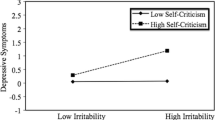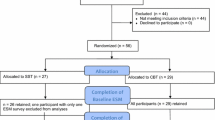Abstract
An experience-sampling methodology was used toexplore the relation between depressive personalitystyles and daily mood regulation. Ninety-five womencompleted the Depressive Experiences Questionnaire (Blatt et al., 1976), and recorded their affectand use of specific mood-regulation strategies twicedaily over a 2-week period. We hypothesized that active,distracting strategies would be more effective in alleviating negative affect than wouldpassive, emotion-focused strategies, and thatself-criticism and dependency would be associated withpoor mood management. Results indicated that engaging ina pleasant, rewarding activity was successful inreducing negative affect, whereas venting prolongednegative affect. Self-criticism was related to poor moodmanagement, as it was associated with venting and failing to spend time with others.Dependency was associated with venting,consumption-based self-indulgence, and being less likelyto spend time alone when regulating negativeaffect.
Similar content being viewed by others
REFERENCES
Band, E. B., & Weisz, J. R. (1988). How to fee l better when it feels bad: Children's perspectives on coping with everyday stress. Developmental Psychology, 24(2), 247–253.
Baumeister, R. F., Heatherton, T. F., & Tice, D. M. (1994). Failure to control emotions and moods. In Losing control: How and why people fail at self-regulation. Sandiego: Academic Press.
Billings, A. G., & Moos, R. H. (1984). Coping, stress, and social resources among adults with unipolar depression. Journal of Personality and Social Psychology, 46, 877–891.
Blatt, S. J. (1990). Interpersonal relatedness and self-definition: Two personality configurations and their implications for psychopathology and psychotherapy. In J. L. Singer (Ed.), Repression and dissociation: Implications for personality theory, psychopathology, and health (pp. 299–336). Chicago: University of Chicago Press.
Blatt, S. J. (1974). Levels of object representation in anaclitic and introjective depression. The Psychoanalytic Study of the Child, 24, 107–157.
Blatt, S. J., D'Afflitti, J. P., & Quinlan, D. M. (1976). Experiences of depression in normal young adults. Journal of Abnormal Psychology, 85, 383–389.
Blatt, S. J., & Schichman, S. (1983). Two primary configurations of psychopathology. Psychoanalysis and Contemporary Thought, 6, 187–254.
Blatt, S. J., & Zuroff, D. C. (1992). Interpersonal relatedness and self-definition: Two prototypes for depression. Clinical Psychology Review, 12, 527–562.
Carver, C. S., & Scheier, M. F. (1981). Attention and self-regulation: A control-theory approach to human behavior. New York: Springer-Verlag.
Catanzaro, S. J., & Greenwood, G. (1994). Expectancies for negative mood regulation; coping, and dysphoria among college students. Journal of Counseling Psychology, 41(1), 34–44.
Clark, L. A., & Watson, D. (1991). A tripartite model of anxiety and depression: Psychometric evidence and taxonomic implications. Journal of Abnormal Psychology, 100, 316–336.
Compas, B., Malcarne, V. L., & Fondacara, K. M. (1988). Coping with stressful events in older children and young adolescents. Journal of Consulting and Clinical Psychology, 56, 405–411.
Coyne, J. C., Aldwin, C. M., & Lazarus, R. S. (1981). Depression and coping in stressful episodes. Journal of Abnormal Psychology, 90, 439–447.
Coyne, J. C., & Whiffen, V. E. (1995). Issues in personality as diathesis for depression: The case of sociotropy— dependency and autonomy— self-criticism. Psychological Bulletin, 188(3), 358–378.
Dombeck, M. J., Siegle, G. J., & Ingram, R. E. (1996). Cognitive interference and coping strategies in vulnerability to negative affect. In I. G. Sarason, G. R. Pierce, & B. R. Sarason (Eds.), Cognitive interference: Theories, methods, findings. New Jersey: Lawrence Erlbaum Associates.
Fichman, L., Koestner, R., & Zuroff, D. C. (1997). Dependency and distress at summer camp. Journal of Youth and Adolescence, 26(2), 217–232.
Fichman, L., Koestner, R., & Zuroff, D. C. (1996). Dependency, self-criticism, and perceptions of inferiority at summer camp: I'm even worse than you think. Journal of Youth and Adolescence, 25(1), 113–126.
Fichman, L., Koestner,R., & Zuroff, D. C. (1994). Depressive styles in adolescence: Assessment, relation to social functioning, and developmental trends. Journal of Youth and Adolescence, 23(3), 315–330.
Folkman, S., & Lazarus, R. S. (1980). An analysis of coping in a middle age d sample. The Journal of Health and Social Behavior, 21, 219–239.
Franko, D. L., Powers, T. A., Zuroff, D. C., Moskowitz, D. S. (1985). Children and affect: Strategies for self-regulation and sex differences in sadness. American Journal of Orthopsychiatry, 55(2), 210–219.
Gross, J. J., & Munoz, R. F. (1995). Emotion regulation and mental health. Clinical Psychology: Science and Practice, 2(2), 151–164.
Ingram, R. E., & Smith, T.W. (1984). Depression and inernal versus external focus of attention. Cognitive Therapy and Research, 8(2), 139–152.
Jolly, J. B., Dyck, M. J., Kramer, T. A., & Wherry, J. N. (1996). The relations between sociotropy and autonomy, positive and negative affect and two proposed depression subtypes. British Journal of Clinical Psychology, 35, 91–101.
Kirsch, I., Mearns, J., & Catanzaro, S. J. (1990). Mood-regulation expectancies as determinants of dysphoria in college students. Journal of Counseling Psychology, 37(3), 306–312.
Koestner, R., Zuroff, D. C., & Powers, T. A. (1991). Family origins of adolescent self-criticism and its continuity into adulthood. Journal of Abnormal Psychology, 100(2), 191–197.
Larsen, R. (1993). Emotion regulation in everyday life: An experience sampling method. Paper presented at the annual meeting of the American Psychological Association, Toronto, Ontario.
Larsen, R. J., & Diener, E. (1992). Promises and problems with the circumplex mode l of emotions. Review of Personality and Social Psychology, 13, 25–59.
Larson, R. (1989). Be eping children and adolescents: A method for studying time use and daily experience. Journal of Youth and Adolescence, 18(6), 511–530.
Lovejoy, M. C., & Steuerwald, B. L. (1995). Subsyndromal unipolar and bipolar disorders. Comparisons on positive and negative affect. Journal of Abnormal Psychology, 104(2), 381–384.
Mayer, J. D., & Gaschke, Y. N. (1988). The experience and meta-experience of mood. Journal of Personality and Social Psychology, 55(1), 102–111.
Mayer, J. D., Salovey, P., Gomberg-Kaufman, S., & Blainey, K. (1991). A broader conception of mood experience. Journal of Personality and Social Psychology, 60(1), 100–111.
McCranie, E. W., & Bass, J. D. (1984). Childhood family antecedents of dependency and self-criticism: Implications for depression. Journal of Abnormal Psychology, 93, 3–8.
Mongrain, M., & Zuroff, D. C. (1995). Motivational and affective correlates of dependency and self-criticism. Personality and Individual Differences, 18, 347–354.
Morris, W., & Reilly, N. (1987). Toward the self-regulation of mood: Theory and research. Motivation and Emotion, 11, 215–249.
Morrow, J., & Nolen-Hoeksema, S. (1990). Effects of responses to depression on the remediation of depressive affect. Journal of Personality and Social Psychology, 58(3), 519–527.
Nietzel, M. T., & Harris, M. J. (1990). Relationship of dependency and achievement /autonomy to depression. Clinical Psychology Review, 10, 279–297.
Nolen-Hoeksema, S. (1991). Responses to depression and their effects on the duration of depressive episodes. Journal of Abnormal Psychology, 100(4), 569–582.
Nolen-Hoeksema, S. (1987). Sex differences in unipolar depression: Evidence and theory. Psychological Bulletin, 101, 259–282.
Nolen-Hoeksema, S., Morrow, J., & Fredrickson, B. L. (1993). Response styles and duration of depressed moods. Journal of Abnormal Psychology, 102, 20–28.
Parker, G. B., & Brown, L. B. (1982). Coping behaviors that mediate between life events and depression. Archives of General Psychiatry, 39, 1386–1391.
Pearlin, L. I., & Schooler, C. (1978). The structure of coping. Journal of Health and Social Behavior, 19, 2–21.
Rippere, V. (1977). "What's the thing to do when you' re feeling depressed?" A pilot study. Behaviour Research and Therapy, 15, 185–191.
Roberts, J. E., & Kassel, J. D. (1996). Mood-state dependence in cognitive vulnerability to depression: The roles of positive and negative affect. Cognitive Therapy and Research, 20(1), 1–12.
Rohde, P., Lewinsohn, P. M., Tilson, M., & Seeley, J. R. (1990). Dimensionality of coping and its relation to depression. Journal of Personality and Social Psychology, 58(3), 499–511.
Rossman, R. (1992). School-age children's perceptions of coping with distress: Strategies for emotion regulation and the moderation of adjustment. Journal of Child Psychology and Psychiatry, 33(8), 1373–1397.
Thayer, R. E., Newman, J. R., & McClain, T. M. (1994). Self-regulation of mood: Strategies for changing a bad mood, raising energy, and reducing tension. Journal of Personality and Social Psychology, 67(5), 910–925.
Watson, D., & Clark, L. A. (1984). Negative affectivity: The disposition to experience aversive emotional states. Psychological Bulletin, 96, 465–490.
Watson, D., Clark, L., & Tellegen, A. (1988). Development and validation of brief measures of positive and negative affect: The PANAS scales. Journal of Personality and Social Psychology, 54, 1063–1070.
Weisz, J. R., Rudolph, K. D., Granger, D. A., & Sweeney, L. (1992). Cognition, competence, and coping in child and adolescent depression. Research findings, developmental concerns, therapeutic implications. Development and Psychopathology, 4, 627–653.
Zuroff, D. C., & de Lorimier, S. (1989). Ideal and actual romantic partners of women varying in dependency and self-criticism. Journal of Personality, 57, 826–846.
Zuroff, D. C., Igreja, I., & Mongrain, M. (1990). Dysfunctional attitudes, dependency, and self-criticism as predictors of depressive mood states: A 12-month longitudinal study. Cognitive Therapy and Research, 14, 315–326.
Zuroff, D. C., Koestner, R., & Powers, T. (1994). Self-criticism at age 12: A longitudinal study of adjustment. Cognitive Therapy and Research, 18(4), 367–385.
Zuroff, D. C., & Mongrain, M. (1987). Dependency and self-criticism: Vulnerability factors for depressive affective states. Journal of Abnormal Psychology, 94, 308–319.
Rights and permissions
About this article
Cite this article
Fichman, L., Koestner, R., Zuroff, D.C. et al. Depressive Styles and the Regulation of Negative Affect: A Daily Experience Study. Cognitive Therapy and Research 23, 483–495 (1999). https://doi.org/10.1023/A:1018768320680
Issue Date:
DOI: https://doi.org/10.1023/A:1018768320680




